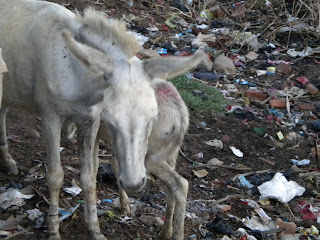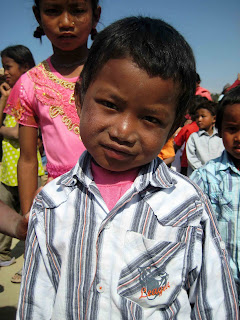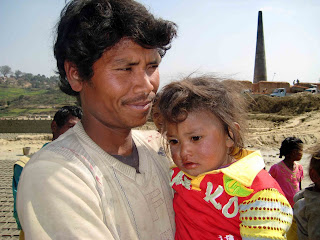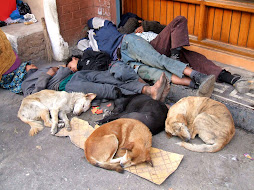

 After having worked with some five hundred donkeys in brick kilns since December 2008, there is still so much we do not know about the conditions of working equines in Nepal. New facts and figures continue to shock us.
After having worked with some five hundred donkeys in brick kilns since December 2008, there is still so much we do not know about the conditions of working equines in Nepal. New facts and figures continue to shock us. In the Summer of 2009 we discovered something very unsettling. Until then we believed the owners of the equines when they said that, yes, their animals had to work hard under very harsh conditions when the brick kilns were running, but that after six months they would return to the hometown of the owners, Nepalgunj . The period May-December would be R&R time for the much abused animals. We believed them. I personally had a vision of donkeys standing under a thatch roof, chewing on fresh grass, nursing their aching bones.
The reality was a less prosaic one. When in May programme manager Krishna and vet Sudeep arrived in Nepalgunj in western Nepal at night, they were shocked to see donkeys on every street corner, rummaging through piles of rubbish. “Why are these donkeys outside on the street in the middle of the night?” they asked the taxi driver. “Oh, that’s where they live. The owners have no land so they abandon them on the street or in the jungle,” the driver remarked casually.
These hardworking equines abandoned after slaving for their owners for six months in brick kilns in far away Kathmandu? Left to fend for themselves without being provided with any food and water? No place to hide from the sun and rain? And all that in the hottest city of the Nepali plains, where it gets as hot as 45 degrees Celsius?
These hardworking equines abandoned after slaving for their owners for six months in brick kilns in far away Kathmandu? Left to fend for themselves without being provided with any food and water? No place to hide from the sun and rain? And all that in the hottest city of the Nepali plains, where it gets as hot as 45 degrees Celsius?
In the following days Krishna and Sudeep saw donkeys giving birth on busy intersections, equines so malnourished they could hardly stand on their feet, and even blind ones bumping into cars and bikes. All of them searching for food and water; many of them were scolded and beaten by shopkeepers.
We gritted our teeth and as a first step published a report on the abuse of working equines in Nepalgunj. You can read the ‘Beasts of Burden’ report on our website under Reports and Docs. We then developed a petition called ‘Stop Donkey Misery in Nepal’ and collected over 1000 signatures. The plea was handed over to the Joint Secretary at the Ministry for Agriculture and Cooperatives.
It was a dream come true when on June 5, 2010 we were able to launch our Nepalgunj Outreach Programme with the support of Donkey Sanctuary UK and India. Krishna and Sudeep again spend two weeks in western Nepal to hire and train local staff and to introduce the programme among local authorities and media. The programme, supported by Donkey Sanctuary UK, started by organizing a press meet to inform the local media about the terrible conditions of equines in their city. The second step was an interaction meeting with the owners of the donkeys, discussing problems and solutions.
Specific objectives of the programme are to stop illegal import of unsuitable equines into Nepal, to improve health conditions of working equines with help of authorities, to improve economic conditions of owners and children, to increase awareness on working equine problems in the local community and to create exposure of the issue in the media.
We have hired a part time local vet, Prativa Shrestha, to treat sick and injured donkeys and to connect the owners to the government veterinary health system. We also hired Surendra Karki as a part time campaigner. He will be responsible for activating the authorities to register the animals, to build shelters, to improve quarantine services and to improve the economic conditions of the equine owners.
Donkey Sanctuary India has promised to help us changing the habits of owners when buying new donkeys in India. Instead of buying the cheapest, weak equines, we will pressurize owners to buy healthy, strong horses and donkeys.
Donkey Sanctuary India has promised to help us changing the habits of owners when buying new donkeys in India. Instead of buying the cheapest, weak equines, we will pressurize owners to buy healthy, strong horses and donkeys.
It is hard to be patient when faced with such a widespread form of animal cruelty. At times we feel like suing all donkey owners for gross violations. But if we want to improve conditions for the hundreds of ‘brick donkeys’ for good, at all levels, we have to work in a less aggressive, systematic manner.
For the time being it’s one donkey at a time until all working equines in Nepal are treated with respect.


















